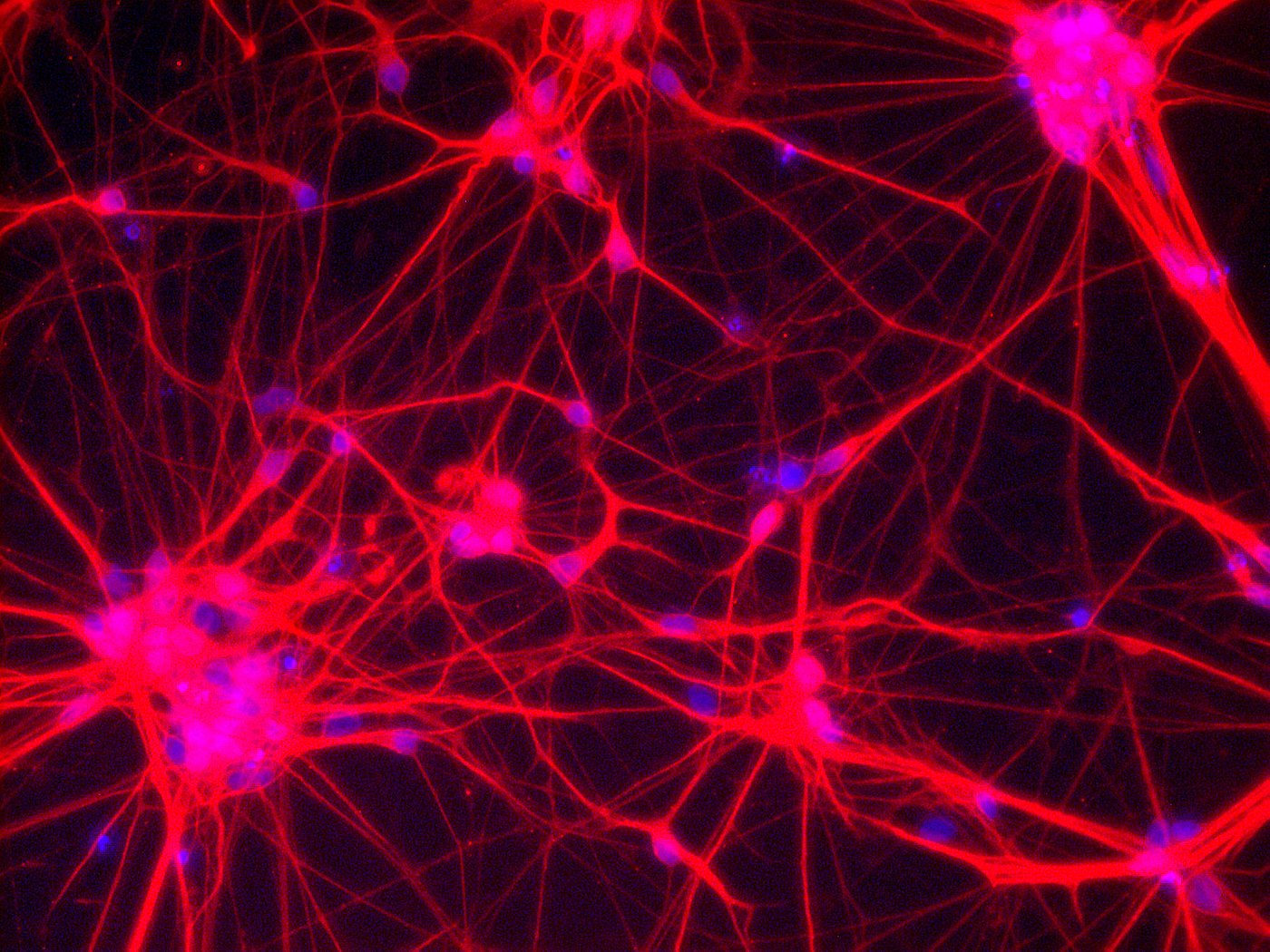
Neurone - Netzwerk aus Nervenzellen (Blau: Zellkern; Rot: Nervenzellen) [Quelle: Institut für Transfusionsmedizin, UK Essen]
Der Alterungsprozess führt zu einer fortschreitenden Schwächung des Herzens. Dies kann die Lebensqualität älterer Menschen erheblich beeinträchtigt und schließlich zum Tode führen. Daher ist das Verständnis der molekularen Mediatoren der Herzalterung sowie die Entwicklung von Ansätzen, die den Alterungsprozess beeinflussen, besonders wichtig und stellt eine wesentliche Herausforderung im Streben nach einer Verlängerung der Lebenserwartung dar.
Eine Zusammenfassung der neuen Publikation finden Sie nachfolgend auf Englisch:
In a multi-model collaborative study to address cardiac ageing using vertebrate models including Killifish (the shortest living vertebrate in laboratory conditions with an average life span of ~9 weeks) and humans, the Kurian lab discovered a biomolecule, sphinganine (DHS), that deteriorates cardiac health by causing extensive DNA damage in cardiomyocytes, the functional building blocks of the heart. Mechanistically, sphinganine progressively accumulates in cardiomyocytes with age and its phosphorylated derivatives are potent inhibitors of histone deacetylases (HDACs). This inhibition of HDACs in cardiomyoctyes leads to histone hyperacetylation and transcription-dependent DNA damage. Importantly, Kurian lab devised three independent small-molecule based interventions to prevent the cardiotoxicity caused by sphinganine. Exogenous increase in cardiac sphinganine levels in healthy young adult mice leads to DNA damage in cardiomyocytes. Signifying its pivotal role in cardiac ageing, an increase in sphinganine levels in young mice leads to severe defects in cardiac function, mimicking the functional deterioration of the aged heart. Importantly, inhibition of histone acetylases (HATs) using an array of small molecules, including the natural compound curcumin, prevents the DHS-mediated cardiotoxicity in vivo suggesting a viable therapeutic strategy to rejuvenate the aged heart.
“Cardiac ageing is a complex process in which cardiomyotcyes start to lose their functionality, so it is critical for us to find the molecular drivers of ageing. In this study, we discovered a major driver of cardiac ageing, sphinganine. Elevated sphinganine levels and loss of genomic integrity is an evolutionarily conserved hallmark of the aged vertebrate heart. Our data indicate that restoring histone acetylation levels in cardiomyocytes by HAT inhibition prevents the DHS-induced DNA damage and functional decline both in vitro and in vivo” says Gaurav Ahuja, the first author of the current study.
Collectively, these data illustrate the significance of lysosphingolipid-mediated loss of genomic integrity in the cardiac ageing process. Future efforts will focus on developing strategies to prevent sphinganine accumulation specifically in the heart to suppress ageing and enhance cardiac health to be used as a preventive clinical approach.
Full publication: Ahuja G, Bartsch D, Yao W, Geissen S, Frank S, Aguirre A, Russ N, Messling J, Dodzian J, Lagerborg KA, Vargas N, Muck JS, Brodesser S, Baldus S, Sachinidis A, Hescheler J, Dieterich C, Trifunovic A, Papantonis A, Petrascheck M, Klinke A, Jain M, Valenzano D, Kurian L (2019) Loss of genomic integrity induced by lysosphingolipid imbalance drives ageing in the heart. EMBO Reports. Apr 20 (4).
The Kurian lab is supported by the NRW Stem Cell Network Independent Group Leader Grant, CMMC, German Heart Association (DZHK), Else Kröner-Fresenius Stiftung (EKFS), Deutsche Forschungsgemeinschaft (DFG) and University of Cologne.